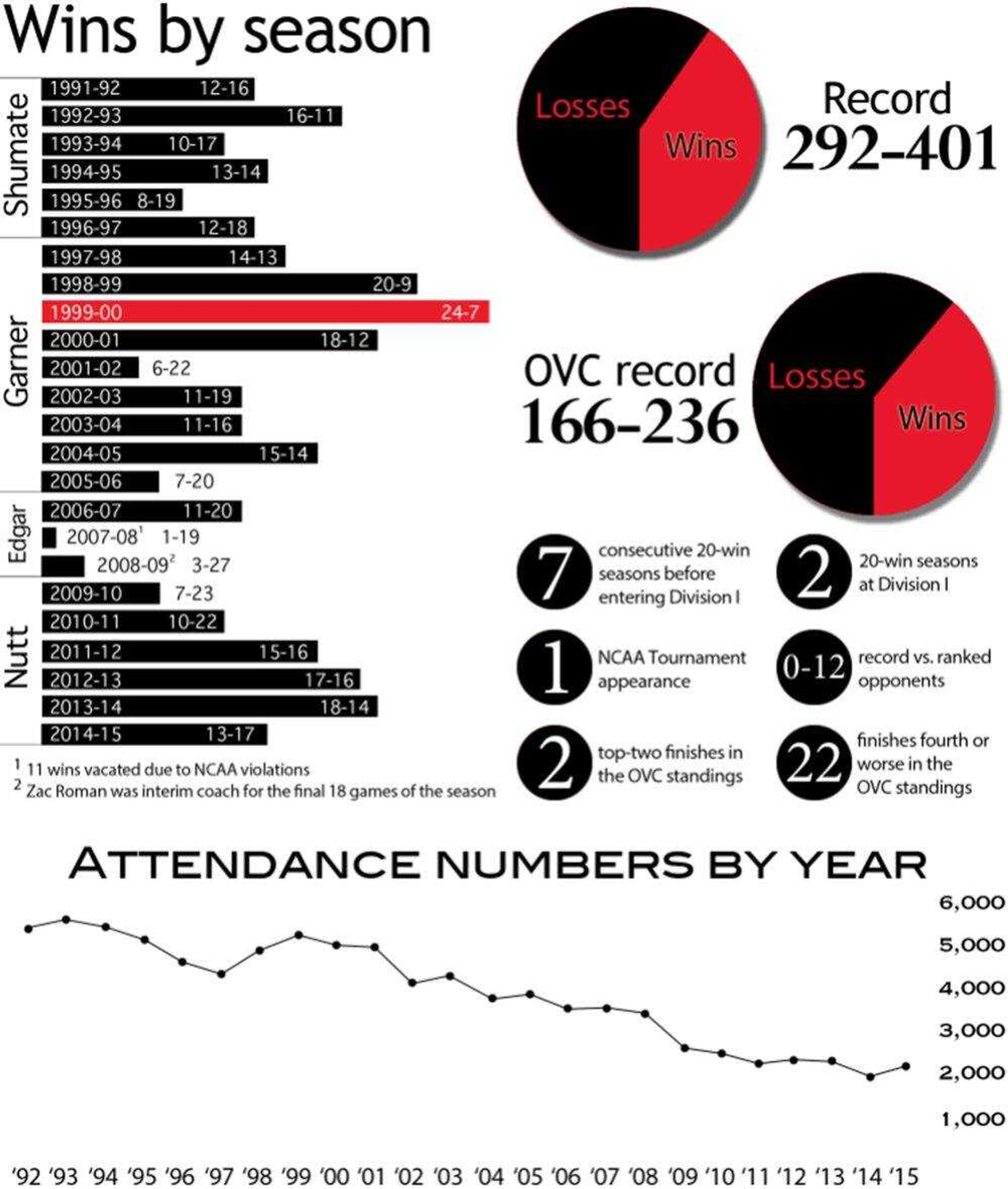Southeast Missouri State's 24 years of Division I men's basketball have been marked mostly by NCAA violations, firings and mediocrity
Five former coaches, three NCAA investigations and just one NCAA tournament appearance are all the Southeast Missouri State men's basketball team has to show for its move to Division I athletics.
Five former coaches, three NCAA investigations and just one Ohio Valley Conference Championship and NCAA tournament appearance are all the Southeast Missouri State men's basketball team has to show for its move to Division I athletics nearly 25 years ago.
Since the then-Indians jumped up to the NCAA's highest level in 1991 following a thriving decade under coach Ron Shumate in Division II there has never been sustained success.
There were only two years under coach Gary Garner at the turn of the century where Southeast has competed for a conference title -- once on the back of star and the only OVC Player of the Year Southeast has ever had in Bud Eley and another with a group that many wouldn't consider the most talented as individuals but together claimed the only OVC championship and NCAA tourney berth in program history.
No coach in the Division I era has left Southeast of their own accord or to pursue a career at a major Division I program. Two were fired in the midst of major NCAA investigations.
Zac Roman coached in the interim for one winless conference season before Dickey Nutt was hired to get the program to a better place.
He did, and was the only head coach of the Division I era that did not leave with a cloud of questionable NCAA actions hanging over his head, but not fast enough or to nearly the championship-contending heights that are sought.
Now Southeast athletic director Mark Alnutt and the university's search is underway for the next option.
The coach will be tasked with trying to break the cycle and bring the Redhawks past the point of respectability and into a period where success is more than making the conference tournament.
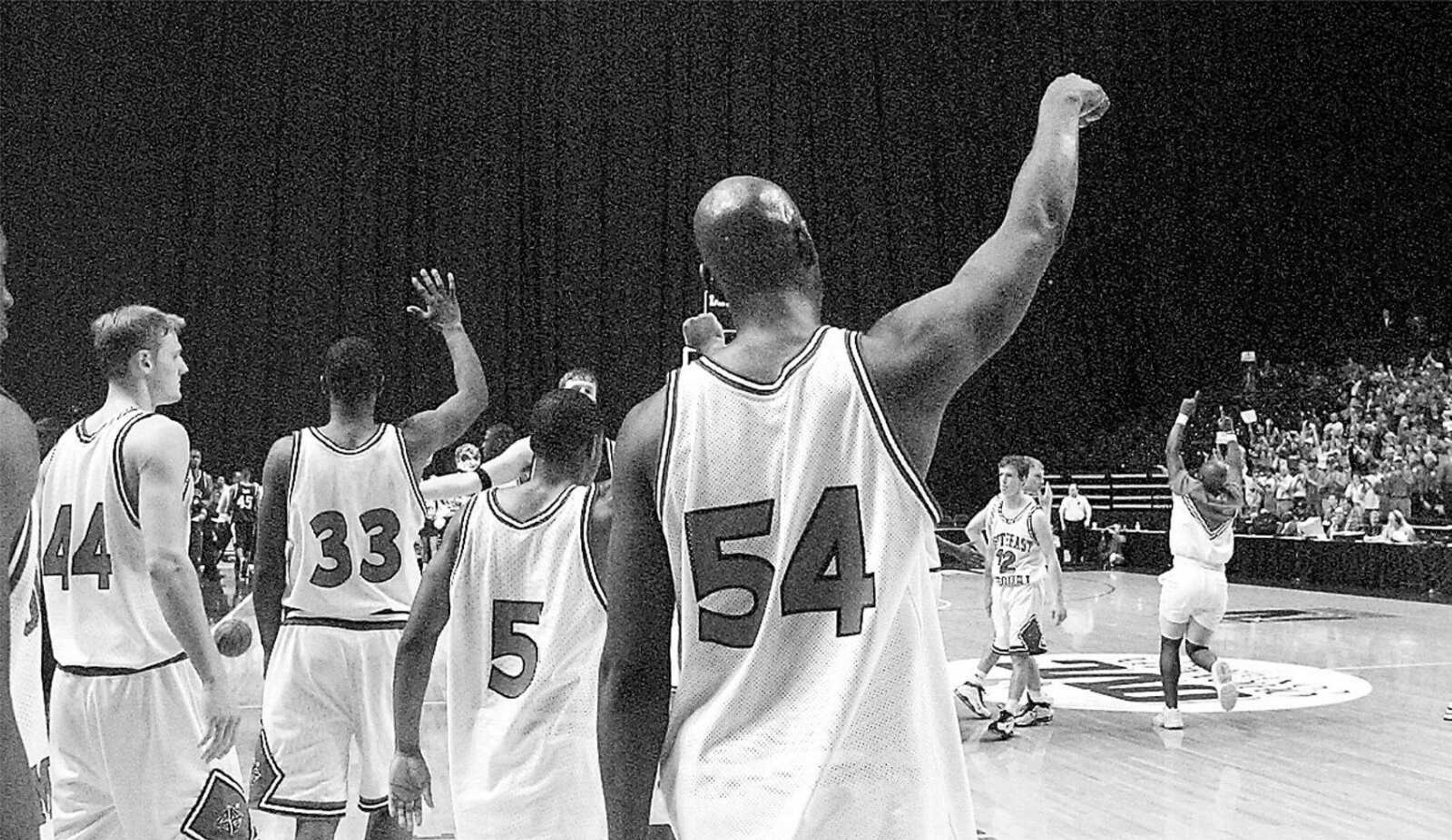
Shumate leads team into Division I
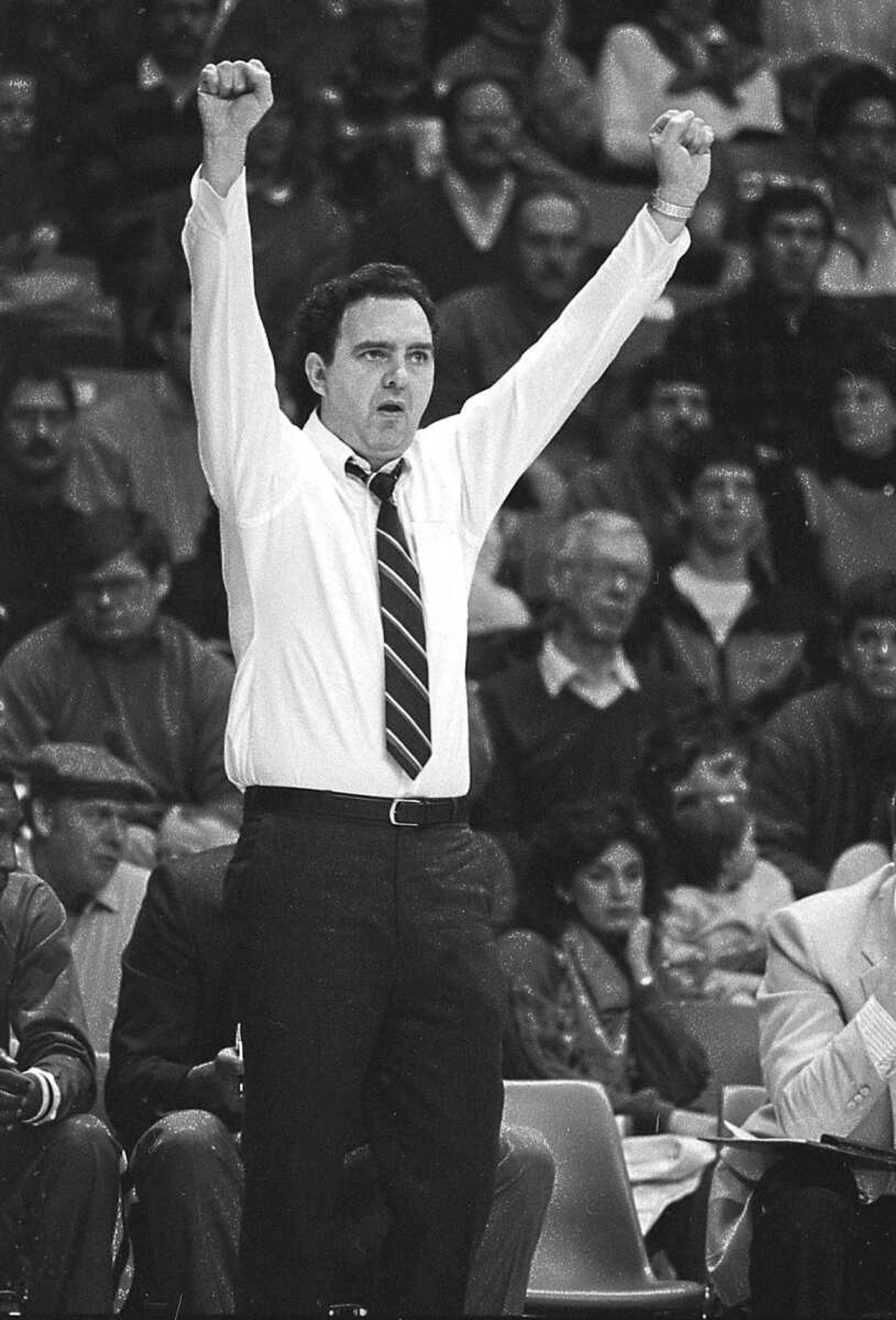
Shumate was hired at Southeast in 1981 and in his first season took the team from last place in the Missouri Intercollegiate Athletic Association to first place for the first time in 18 years. The Indians reached the Division II national quarterfinals that season.
Southeast had nine seasons with 20 or more wins under Shumate, including seven consecutive leading up to the jump to Division I, and competed in the national tournament eight times, finishing second twice.
Shumate's squads routinely drew sellout crowds to Houck Field House and continued to draw large numbers to the Show Me Center once it opened in 1987.
"They would start lining up for blocks and blocks early in the afternoon to get into a night game at Houck Field House. It was just packed," former Southeast sports information director Ron Hines said. "If it had not been for Ron Shumate and his success, there would not be a Show Me Center. I've been around a long time, and I feel comfortable in that statement."
Hines, who was the SID from 1980-2009, said that Southeast's administration chose to move to Division I prior to the 1991-92 season to "lift the image of the university."
"They always said that a No. 1 by your name was better than a No. 2 by your name," Hines said.
The transition wasn't the smoothest. Shumate went 71-95 in six Division I seasons, with the lone winning season coming in Year 2.
Recruiting was the biggest challenge because of an NCAA rule that did not allow a team to compete in its conference tournament in its first seven years after becoming Division I.
"All the kids, their dream is to play in March Madness, the NCAA tournament," Shumate said from his home in Florida this week. "That really hurt our recruiting, and I alerted the administration about that -- our athletic director and the president -- but I was told, 'Don't worry, Ron. We understand that it's going to be tough.'"
Shumate was fired on May 15, 1997, after the start of an NCAA investigation. His team posted a record of 12-18 in his final season that put his Southeast record at 306-171.
"Basically before I was terminated I used to get calls from the administration: 'Are you through recruiting yet? Are you through recruiting yet?' because they knew that one thing I could do -- I felt like I was a pretty good recruiter. Once the recruiting was over, that's when the hammer dropped," Shumate said. "I think it was Coach Garner that got the job after I was terminated, and he was able to go to the NCAA tournament with the kids that we had recruited, so that made me feel good that we left the stables full for the next coach coming in."
The men's basketball program was placed on probation for three years when the NCAA reached their decision in April 1998. Shumate and his staff were found to have committed several violations that included loaning money and making cash payments to players. The university was also found to have provided financial aid to an ineligible player.
Shumate maintained his innocence and said that he felt, "like we ran one of the cleanest programs in the country."
Garner takes over
Garner replaced Shumate after 17 years at Southeast and almost immediately put together the program's best seasons at Division I.
The Indians went 14-13 in Garner's first season before recording the program's only 20-win seasons since the move up.
They finished 20-9 and lost 62-61 to Murray State on a last-second shot by Aubrey Reese in the OVC tournament championship in 1999.
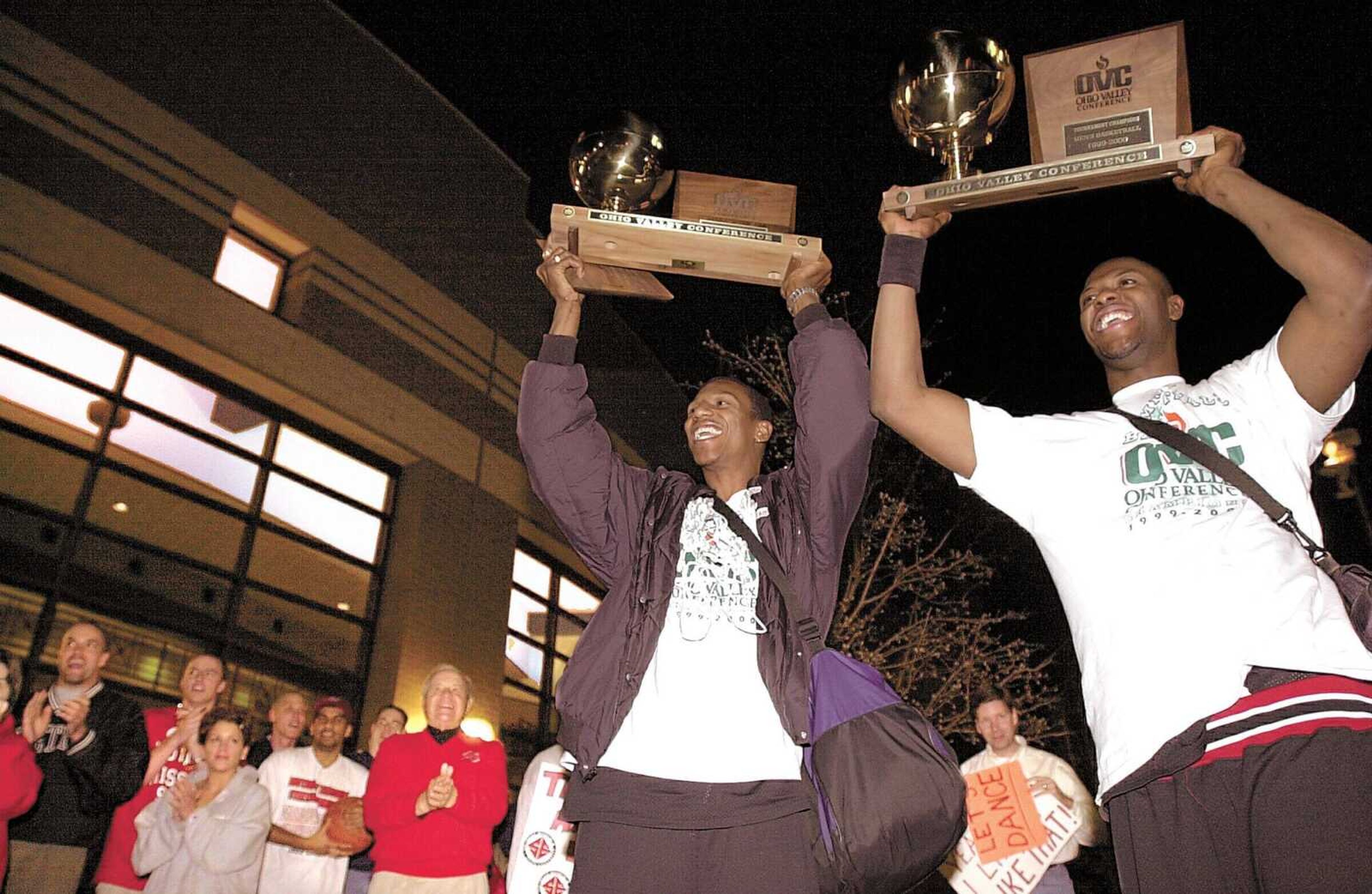
Eley, the OVC Player of the Year that season, concluded his Indians career with a 20-point, 17-rebound performance. Southeast's star added seven assists and four blocked shots.
The Indians shared the OVC regular-season title with Murray State the following year and defeated the Racers 67-56 in the tournament to secure the program's only NCAA tournament berth.
"I watched some really, really good guys work together and they piecemealed a team to win," said Kevin Williams, who was an assistant for Garner from 1997-2000. "They looked at, 'OK, we need rebounding. We need a point guard that can handle. We need on-ball defenders.'
"It was like nobody was 1-5 perfect as far as the skill level goes, they might have a deficiency here or there, but you put four or five, six or seven guys together who all have the skill sets to do certain things and it allows you to play how you need to play to win."
Southeast, a 13 seed in the NCAA tournament, lost to No. 4 LSU 64-61 in the first round to finish the season 24-7.
"It was just a great group of guys. We had excellent talent," said Tim Scheer, a member of the OVC championship team. "It was a fun time for me being a freshman. I didn't get a lot of playing time, but it was definitely fun to be a part of that group of guys."
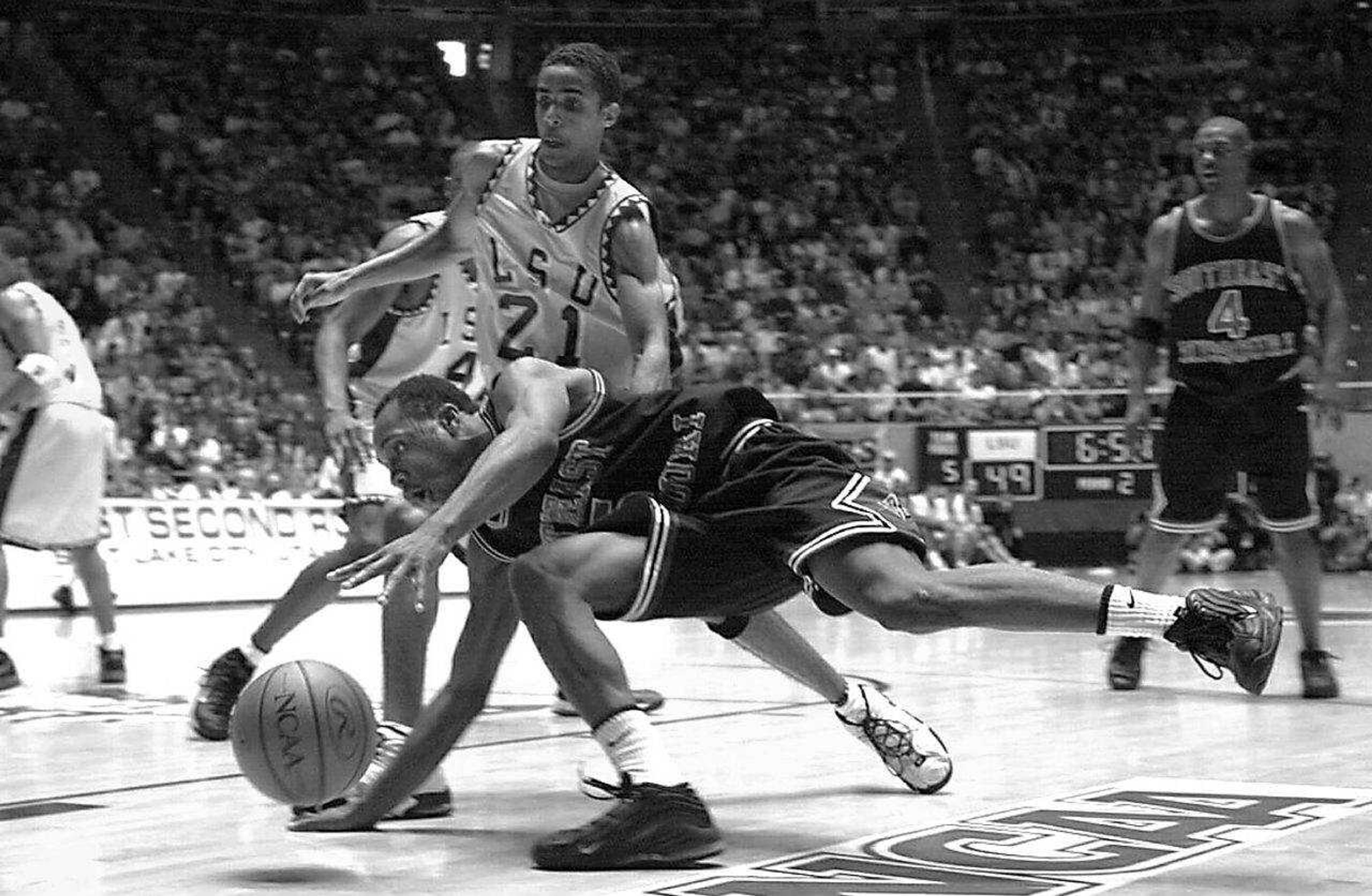
Southeast went 18-12 the following season before a drastic dropoff to 6-22 after Shumate's recruits were gone from the program. The Indians had one more winning season under Garner, going 15-14 in 2004-05.
"Well, we just lost a lot of talent, and it's hard to maintain that high level of talent year in and year out," Scheer said of the remainder of his Southeast career. "It's a tough league."
Garner's contract was not renewed in March 2006 after Southeast finished the season 7-20.
"Most of the necessary ingredients are there to have a really good basketball program and be competitive in the Ohio Valley Conference," said Garner, who would say only that the "financial end of it" was what was and still is missing.
He was replaced by Edgar a month later and on June 30, 2006, Southeast announced that the team had violated NCAA rules under Garner by allowing ineligible players to travel to away games with the team. The penalty was a loss of five recruiting days and a $12,600 fine that the university paid. Garner said he was unaware that was a violation.
Garner has coached at Dakota State University in Madison, South Dakota, for six the past seasons.
Edgar era begins
Edgar had led Murray State to three OVC championships, two NCAA tournament appearances, a bid to the NIT and a 79-40 record from 1991-95 before taking the reigns at Southeast.
He left his post as an assistant to Bruce Pearl at Tennessee after one season to coach the Redhawks.
Southeast went 11-20 and 12-19 during his first two seasons, although 11 of those wins from the 07-08 season were wiped from the record books as a result of the program's third NCAA investigation.
Those were the only games he coached at the university before the questions from the NCAA began.
"I just really, really had a strong urge to go after it and looking back I can still say I fortunately got it," Edgar said of the Southeast job. "That's just how life goes sometimes."
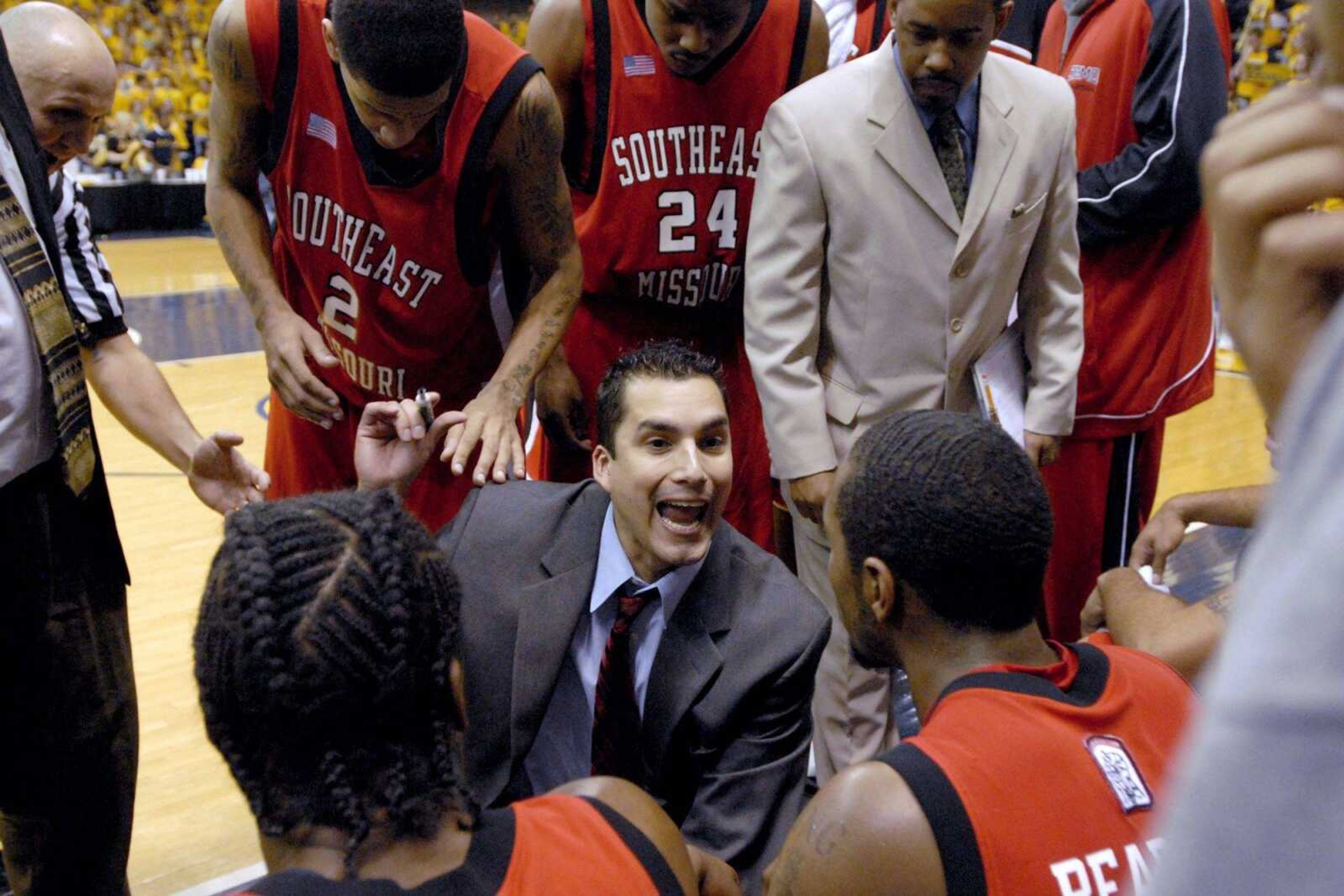
Edgar was placed on administrative leave in Oct. 2008, along with athletic director Don Kaverman, and Roman was named the acting head coach. Edgar's received a buyout of approximately $325,000 when his contract was terminated on Dec. 30 that year.
Edgar said a season-ending knee injury to the Redhawks' best player and team leader, Brandon Foust, in a game against Austin Peay during the 2007-08 season was when everything began to spiral out of control. Southeast was 6-2 and in second place in the conference at the time.
The Redhawks won one game the remainder of the season and as the losing continued "resentment" amongst the players grew, according to Edgar.
"At the same time I know there was a lot being said behind my back and in the community and in the coaching fraternity about me, and it culminated when I made a staff change and then that's when the whole thing blew up," Edgar said, referring to assistant coach Ronnie Dean, whose contract was not renewed following the season. "That's when all of the accusations and allegations against me and my character and my integrity came about."
Edgar denied that any of the allegations against him were true, but, based on interviews with Dean and Southeast players, the NCAA declared that he had arranged for impermissible benefits for two players.
The extra benefits included $239 being paid for a player's institutional fees that would have kept that player from enrolling in classes as well as a player being driven by Dean, who is now an assistant at Jacksonville State, to Memphis en route to Atlanta to see his newborn child.
The NCAA also ruled that members of the coaching staff were present during summer strength and conditioning sessions and out-of-season pick-up games, which is impermissible.
The program was placed on three years probation by the NCAA in Aug. 2009. The university self-imposed reductions of scholarships and recruiting visits, too.
Edgar received a three-year show-cause from the NCAA while Dean was given a one-year show-cause for his participation in the violations.
"I wish the school the best. You get over things," said Edgar, who has coached at Eastern Oklahoma State College since 2010. "It's a Christian obligation to forgive. ... Despite all this, my family has been blessed. I have grown immeasurably and spiritually through this."
The program was at its worst, coming off a 3-27 season where it was winless in conference under Roman in the interim in 2008-09.
Then came Dickey Nutt, who became Southeast's 19th head coach and fifth of what had so far been a disappointing Division I era on March 12, 2009.
Nutt returns program to respectability
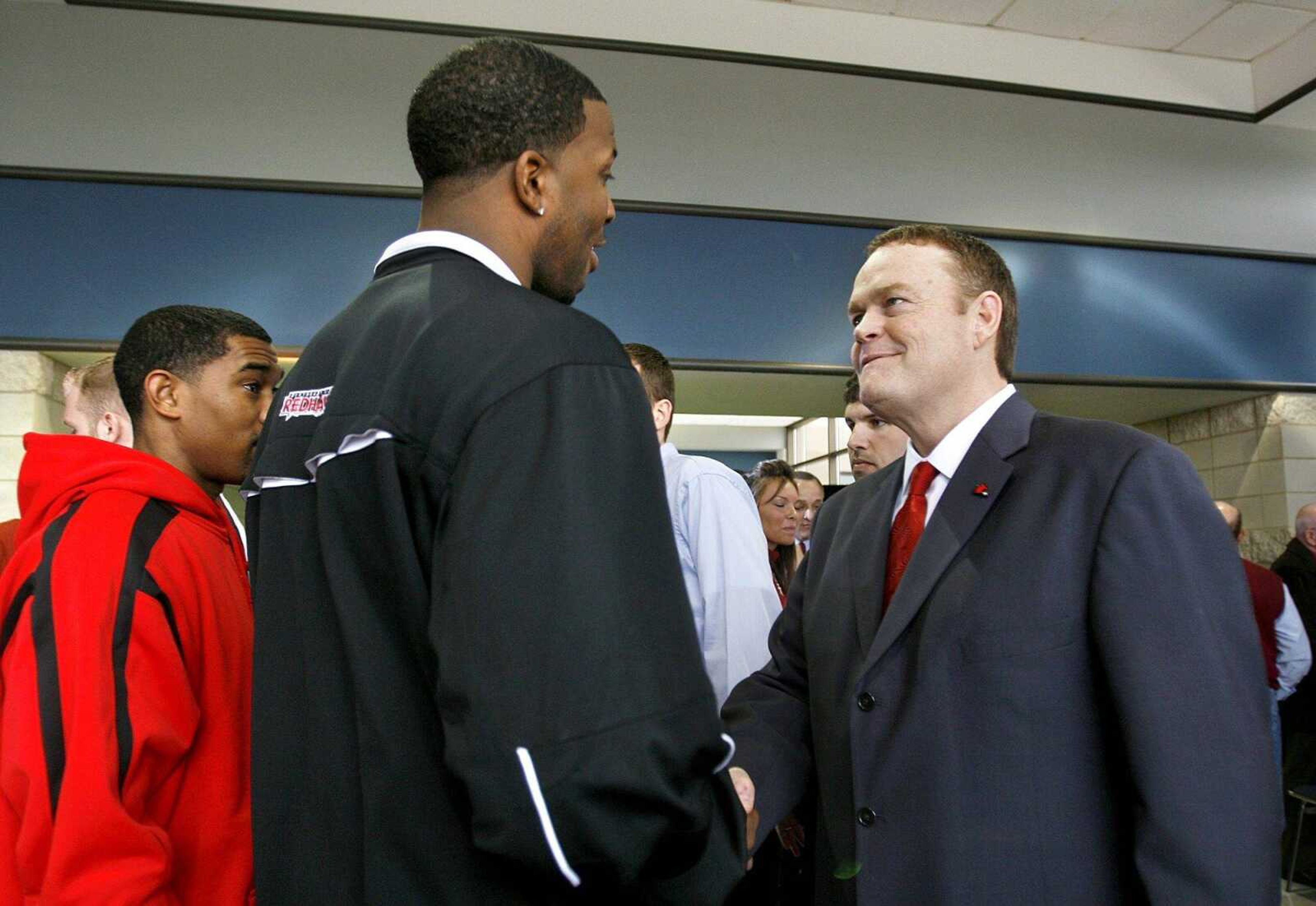
The Redhawks' overall record improved in each of the first five seasons with Nutt at the helm. They even had consecutive winning seasons for the first time in 15 years in 2012-13 and 13-14.
Southeast reached the conference tournament each of the last five years and with the exception of this past season the Redhawks advanced out of the first round in each appearance.
Nutt brought Southeast out of the depths of Division I while the program was hampered by probation and did it without being investigated for any major NCAA violations.
But after six seasons and little improvement in the conference, Nutt was fired on March 23.
"I think over the last six years he's definitely made Southeast a contender in the OVC," said Marland Smith, who played under Nutt from 2009-13. "We haven't had the most success, but the program is definitely two or three steps ahead of where it was when he first took over."
The Redhawks won three OVC games in Nutt's first season, six in his second year and posted their best conference record of 9-7 in Year 3.
Southeast finished 8-8 in conference the next two seasons before posting a 7-9 record that put it in the tournament as the eighth seed in what would be Nutt's final season.
The news of his termination came as a surprise to Nutt even though prior to the season he and Alnutt had discussed a need for improvement in conference, which included finishing high enough in the standings to receive a first-round bye in the OVC tourney. Instead the Redhawks were bounced from the tournament in the first round for the first time under Nutt.
Nutt had agreed on a new contract in April 2009 that made him the Redhawks coach through the 2016-17 season but also made it less of a burden to buy out the remainder of his contract.
He said following his firing that he was disappointed with the timing because he'd had a meeting with Alnutt following the team's final game and although he was told Alnutt had some "decisions to make" he was to continue recruiting and go about his business. A few weeks later the search for his replacement began.
"I just thought it was only a matter of time [to contend for OVC titles], but when you're taking a program that hasn't had a lot of success everybody wants it to get done immediately. You know, right now," Smith said. "It was a process. Like I said, every year, with the exception of this past year, the wins increased. I feel for some people it didn't happen fast enough."
Another search begins
The open position is an appealing one, according to the former players, coaches and athletic department members, and many of them agreed on three things when discussing the current status of the program. First, it's difficult to see the program in the lackluster state it's been in for much of the Division I era. Second, it's still possible for Southeast to surmount the struggles of its past and become a winning program. Third, now's as good a time as any to find the right person, but it will take the right price.
"There's no question about that," said Cory Johnson, who played at Southeast from 1997-99, when asked if the program was capable of winning. "With the facilities alone that you have and just the area you're in -- located two hours from Memphis, an hour and a half from St. Louis, easy access to Chicago and some of these big basketball markets that you can get to -- there's no question you can build a winner here. I think one of the key things is obviously compensation for these coaches."
Johnson wasn't the only person to point out that Murray State men's basketball coach Steve Prohm, who led the Racers to their 24th OVC regular-season championship this year, agreed to a contract that increases his base salary to $490,000 along with about $10,000 for radio and TV agreements.
Alnutt said following Nutt's firing that he wanted to make it "very competitive in terms of salary for the head coach and also for the assistant coaches salary pool," with the new hire. Nutt's base salary was $124,848.
The Show Me Center, which is set to undergo extensive renovations this summer, was mentioned on multiple occasions when talking about the past and future of the Southeast basketball program as one of the top facilities in the OVC.
Alnutt is optimistic that the 20th Southeast men's basketball coach will be in place by the end of April.
"I really do think they're facing an opportunity right now to sort of right the ship," said Hines, who is retired and resides in southern Illinois. "If they'll put the funding with a good hire they could get it back. It really bothers me as someone who worked hard to build the Show Me Center and back in the early days when Shumate was there and Gary Garner was there the Show Me Center was full or nearly full every night. Now I see the clips on TV and it looks like there's not enough people to start a good fight. That bothers me as someone who lived through all of that."
Johnson, who still lives in the area, has rarely attended games over the last decade because he didn't enjoy the teams he was watching.
"Almost every night that I was here for two years we led the league in attendance and it was from the band to the student body to the boosters," Johnson said. "It was just a fantastic atmosphere. It was lively. It was loud. There wasn't many seats left in the building. You go now and you're lucky to get 1,500 people in that building, and it's sad to see."
"We need basketball players here, and that's the thing I think has been missing the past few years," added Johnson, who coached at Kelly and Jackson high schools. "We've had the athletes, no question about it, but I just think you look at the Belmonts and the guys that they put on the floor and the way they play the game of basketball, the Murray States and even looking at Eastern Illinois and teams like that just in our conference play. You watch them and you see that sense of team basketball, and it just hasn't been that way here that we've seen the past few years."
Edgar and Garner both expect that Alnutt has a large pool of enticing candidates to choose from and believe that Southeast's facilities and community are some of the most favorable in the conference.
"I think it's a great situation -- a great town to live in with great fan support," Garner said, noting that his former assistant at Southeast, Anthony Beane Sr. had applied. "I think you'll find that you'll have many, many good candidates."
Regardless of who it is, or when it is announced, the next person to hold the title of Southeast men's basketball coach will have to do what no other coach in the Division I era has been capable of and to try raise the Redhawks to new heights.
"I think like everybody I'm looking forward to who it is and hopefully it's a big change for us," Johnson said.
Connect with the Southeast Missourian Newsroom:
For corrections to this story or other insights for the editor, click here. To submit a letter to the editor, click here. To learn about the Southeast Missourian’s AI Policy, click here.

